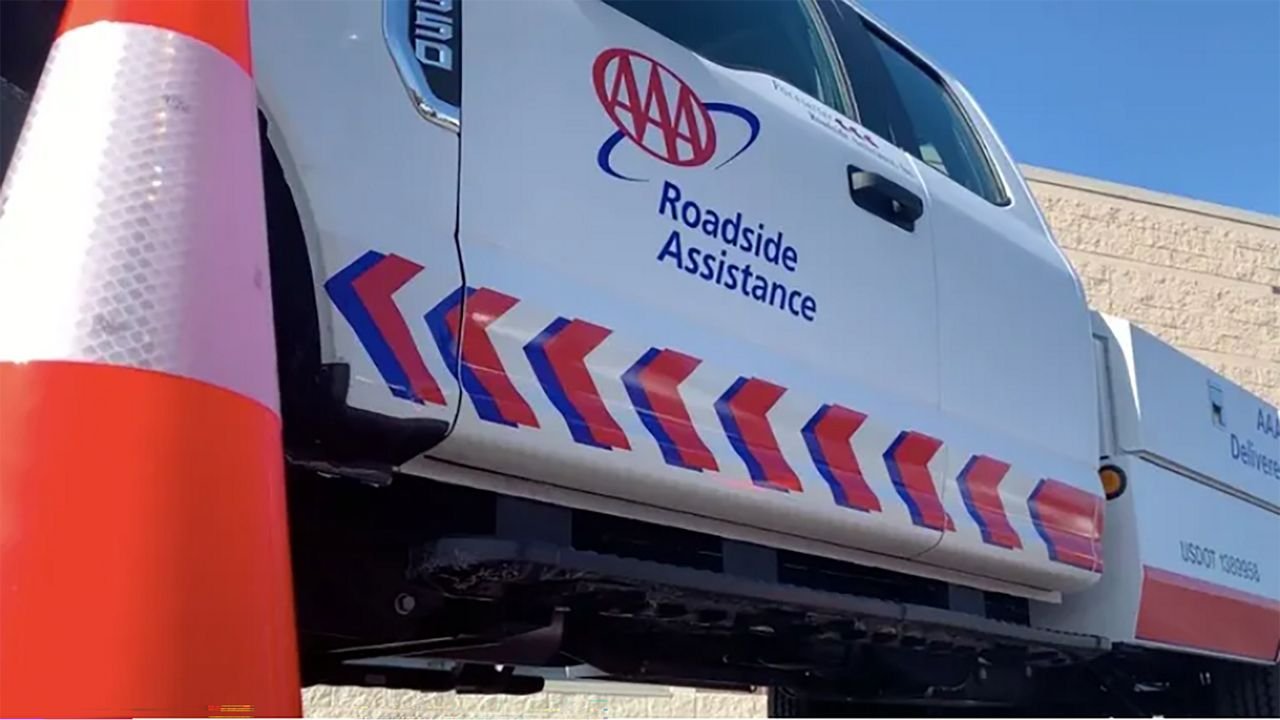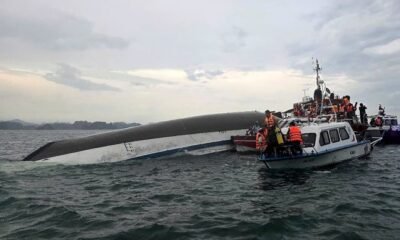Tips & Advices
AAA expects to help thousands Ohioans over July 4

OHIO — As 3.1 million Ohioans plan to hit the road to get to their destinations this holiday weekend, the American Automobile Association said it expects to help thousands of them who may face challenges along the way.
“Dead batteries, flat tires and lockouts will be the leading reasons AAA members will experience car trouble,” said Kevin Gore, battery technician, AAA Fleet Services.
AAA said most roadside trouble can be affordable. While officials advise drivers to get their cars checked before their journeys, they also encourage people to follow the acronym B-E-T: Batteries, engine and tires. AAA said if these systems are checked, the odds have having a serious breakdown are greatly reduced.
Batteries, engines and tires are the most common issues on a trip, and drivers can take the following precautions:
- To check for battery-related issues, have a simple battery test through dealerships, car services places and more.
- As for the engine, there could be cooling system failtures, especially in cars that are 10 years or older. Drivers should check for fluids, such as coolant pooling under the car, which can foreshadow a problem.
- As for tires, drivers can minimize this risk by checking tread depth, tire pressure and whether their vehicle is equipped with a spare tire.
If a breakdown occurs, AAA said to safely guide your car to the far right, away from the lanes of travel, if possible. Stay in the car, and call for help. When help arrives, stay in the car until police or other officials approach the car with more instructions.
AAA also encourages drivers to pack an emergency kit. This should include water, non-perishable food items, jumper cables, a flashlight with extra batteries, road flares or some sort of emergency light, basic hand tools and a first-aid kit.
Additionally, have a fully charged cellphone on hand, always.
Tips & Advices
Now, India Joins Canada, UK, Australia, UAE, Singapore, and USA To Embrace CyberSafe Travel Era as TripJack and BOXX Launch Digital Tourism Security Solution, Here’s More

Sunday, July 20, 2025
When travelers from busy hubs like Mumbai, Delhi or Bengaluru are planning their next trip, they often overlook the unseen threats lying in wait online. And yet in a time when we board planes, show passports, make hotel reservations, and consummate credit card purchases on our smartphones, it is now as critical to our physical safety that we be safe from predators in the digital sphere. So for the first time, TripJack, India’s largest B2B travel platform, has collaborated with global specialist BOXX Insurance to launch CyberSafe – a revolutionary cyber defense suite to protect travelers against digital crime. Not only does this drive establish India as a progressive tourism market, but also raises the bar for travel safety globally.
Add Digital Security To Your List Of Travel Essentials
India’s tourism sector has seen spectacular growth in recent years with governments pushing for Safe and Honourable Tourism guidelines to safeguard visitors and locals. Historically, the datum for attention would be on public health, on crime prevention, on physical infrastructure. What’s been lacking until now is a comprehensive approach to protecting against digital exploitation — including identity theft, financial fraud and phishing scams — especially for travelers.
CyberSafe fills that gap. It offers real-time identity monitoring, dark web alerts, access to Wi‑Fi advocacy specialists, restoration support, and resources that help educate travelers about threats before they escalate to incidents. In essence, CyberSafe is a “digital first aid kit” for travelers, that could help lessen the emotional and financial cost of cybercrime while overseas.
Facing an Escalating Digital Threat
According to studies, 35% of Indian travelers have been a victim of a cybercrime while overseas, and internationally more than a quarter of all international travelers are affected by a cybercrime during their trips. Those numbers reflect the changing nature of travel — routine activities like sending money, looking up personal facts or booking a tour can pose risks to the traveler.
TripJack now delivers digital defenses to its traveling customers with the help of BOXX Insurance, a European and North American insurer that specializes in cyber-incident response for business travelers. This step places the Indian travel ecosystem right at the top of integrated travel protection: a combination of flight and health insurance coupled with digital trust.
Strengthening India’s Travel Framework
The Indian government(Ministry of Tourism) focuses on the safety of travellers and consumer rights. CyberSafe is in line with these strategic efforts, providing an extra dimension of safety within the framework of e-tourism. This partnership also contributes to the observance of legislations that encourages information exchange, emergency response, and ICT security such as the Safe and Honourable Tourism Code of Conduct.
At the same time, the nut on the job done by cyber security agencies including CERT-In (Computer Emergency Response Team India) to secure the national digital infrastructures has been tightened. With a traveler-centric service like CyberSafe, national capability is translated into personal confidence: cyber protection you can take with you, and take to the bank.
CyberSafe: What It Means for Travelers, and Industry
For travelers, specifically holiday-makers in places such as Phuket, Maldives, Dubai, or Barcelona, CyberSafe provides that peace of mind by completing the digital chain – when they first come until after they leave. For travel agents and service providers, it becomes a powerful differentiator — a way to demonstrate they really care for travelers well-being rather than just the journey itself.
With more than 72,000 travel agents on their platform, TripJack in India will now provide CyberSafe in their bundled travel deals. This would enable agents in Tier 2, Tier 3 and metro cities to offer a superior customer experience while safeguarding confidential information and digital assets.
Enhancing Tourism Brand and Trust
In global tourism, in which a destination’s reputation and a traveler’s confidence are inextricable, India’s action sends a clear signal: The country is in the business of not only hospitality but also comprehensive care. Securing borders is a matter of national ambition now on land, in the air and at sea —& this day & age, digitally.
With India pushing for a better ranking in global tourism stats and more business travelers and digital nomads making their way here, having CyberSafe as part of the travel checklist improves both the public perception and competitive edge.
A New Era of Foreign Travel Security
This is more than a stand-alone product, it is part of a broader transformation in travel policy and practice. Canada, the UK, Australia and members of the EU are all coming to expect citizens to guard not only their own health but also data while traveling. India’s CyberSafe campaign dovetails nicely with these current global standards.
As governments prioritize keeping citizens safe when they are outside the country (and safe can mean protection not just from physical harm, but also from cyber injury), travel safety now encompasses ALL risk factors. This is consistent resourcing with best practice consumer protection and digital stewardship globally.
Conclusion: Digital Care and Travel Culture
Travel has always been about more than luggage weights — it’s about curiosity, resilience and trust. Now a traveler’s safety can hinge on invisible digital defenders. CyberSafe acknowledges that fact and provides essential tools for travelers to concentrate on discovery, rather than exposure.
By incorporating digital safety into tourism, TripJack and BOXX are illuminating a new kind of care — one that protects passports and phone data plastered together. This is where tourism intersects with technology and trust blooms. And within that is true freedom for travelers.
Tags: asia-pacific, Australia, Bengaluru, BOXX Insurance cybersecurity travel, Canada, CyberSafe TripJack, Delhi, digital safety tourism, Dubai, global tourism, India, India travel cyber protection, london, mumbai, New York, north america, Singapore, south asia, southeast asia, sydney, Toronto, travel insurance India 2025, UAE, UK, United Arab Emirates, United Kingdom, United States, usa
Tips & Advices
Khareef season: Omani authorities issue safety tips for travelling to Dhofar after crash

In the midst of Salalah’s Khareef season, many UAE residents drive to Oman to experience the lush green landscape as the monsoon rain touches the land.
While the rains bring cooler temperatures and helps create unforgettable moments, it can also bring about safety hazards, particularly near water bodies. Stressing the need to exercise caution, Omani police shared safety tips for those travelling to Dhofar:
Stay up to date with the latest news. Follow KT on WhatsApp Channels.
-
Do not park your vehicle in unsafe places, such as near slopes. This puts your life and the lives of others at risk. Be responsible and stay away from dangerous locations.
-
Never leave children unattended near ponds and bodies of water, as even a moment of inattention can cost you
-
Keep the vehicles clean, and avoid dirty cars. Do not obscure the plate number, as owners can be held legally accountable for this
-
Passengers must not lean out of the window or roof of the car while driving recklessly; this can also expose you to legal accountability.
In a tragic accident in early July, a multi-vehicle collision in Dhofar killed 5 people, including two Omanis and three Emiratis who were from the same family. The crash injured eleven others, including two Omanis and nine Emirati citizens of which five are children.
The Emirati family members who died in the crash are a couple, and the wife’s mother. The couple’s eight-month-old daughter was hospitalised in Oman.
The family had travelled to Salalah for a summer break, but the tragic accident occurred just 12 hours after they left the UAE.
After the collision, UAE travellers spoke to Khaleej Times, sharing precautions to take while planning the journey, such as ensuring the vehicle is in good condition.
They also shared safety advice for driving through the tricky terrain, such as checking fuel levels, and driving at a speed lower than the speed limit in some areas.
Tips & Advices
US Issues Urgent Level 2 Travel Advisory for Dominican Republic Highlighting Crime Risks and Essential Safety Tips for Travelers

Sunday, July 20, 2025
The U.S. Department of State has recently updated its travel advisory for the Dominican Republic, now categorized as a Level 2 destination, advising American travelers to “exercise increased caution” due to the persistent threat of crime. This update follows concerns about violent crime, including robbery, homicide, and sexual assault, in popular tourist areas. However, while some critics have dismissed the warnings, the Dominican Republic continues to attract millions of international visitors each year. Here’s an overview of what travelers should know about the advisory, safety tips, and why this Caribbean gem remains a top vacation destination.
U.S. Travel Advisory Update for the Dominican Republic
On June 12, 2025, the U.S. Department of State elevated its advisory for the Dominican Republic to Level 2, urging travelers to “exercise increased caution.” This warning highlights the risk of violent crime despite the heightened police presence in areas frequently visited by tourists. The advisory pointed out that both locals and tourists may be vulnerable to robbery, sexual assault, and homicide, with criminals often escaping prosecution. However, the Level 2 advisory is considered a moderate alert, advising travelers to be aware of increased risks, but not urging a halt to travel entirely.
Level 2 advisories are a common designation for many tourist destinations around the world, and the Dominican Republic shares this rating with other popular travel spots such as Panama, the Netherlands, and the Philippines.
The Canadian government has also issued a similar advisory, cautioning travelers to “exercise a high degree of caution” due to concerns about violent and petty crime, including fraud, poor road conditions, and issues with public transportation. Despite these risks, the country remains a top destination for North American tourists.
How to Stay Safe in the Dominican Republic
While the U.S. travel advisory highlights the risks present in the Dominican Republic, travelers can take several precautionary steps to ensure a safe and enjoyable trip. The U.S. Department of State has provided key safety recommendations, including:
- Stay Vigilant: Always be aware of your surroundings, especially in crowded or unfamiliar areas.
- Avoid Flashy Displays: Keep valuables like phones, jewelry, and expensive items out of sight.
- Travel in Groups: If possible, explore with others rather than traveling alone, especially in unfamiliar areas.
- Secure Your Belongings: Never leave your food, drinks, or personal items unattended, and always be cautious in public spaces.
- Use Trusted Transportation: Experts recommend using reputable taxi services or ride-sharing apps like Uber instead of unregistered motorcycle taxis (motoconchos).
For emergencies, the Dominican Republic provides reliable services including the 911 emergency response system and a tourist police force (POLITUR), ensuring that help is available when needed. Many resorts also offer private security personnel, and it is strongly advised to stay within the safety of the resort boundaries, particularly for first-time visitors.
Cultural Awareness and Preparation
To ensure smooth travel experiences, it is recommended that visitors familiarize themselves with the local culture, norms, and language. Knowing basic Spanish phrases and understanding the country’s political sensitivities—such as its complex relationship with neighboring Haiti—can enhance both safety and comfort during a stay. Additionally, being respectful of local customs and traditions can help avoid misunderstandings and ensure a more enriching trip.
Why the Dominican Republic Remains the Caribbean’s Top Destination
Despite the recent advisory update, the Dominican Republic continues to be the Caribbean’s most visited country. In 2024, the island saw 34.2 million international arrivals, marking a 6.1% increase from the previous year. American tourists represent a significant portion of this traffic, accounting for nearly half of the arrivals during the first half of 2024.
However, there has been a slight decline in North American visitors in 2025, with a 5.12% drop in American arrivals and a 4.43% decrease in Canadian travelers compared to the same period in 2024. The Ministry of Tourism attributes these declines to seasonal factors such as the leap year and changes in holiday scheduling. On a positive note, South American tourism has surged, with a 31.3% growth in arrivals from that region during the first quarter of 2025.
The Dominican Republic remains a beloved destination thanks to its white-sand beaches, vibrant culture, warm climate, and relatively low-cost travel options. The country’s straightforward entry requirements, including minimal visa processes for most travelers, also contribute to its popularity.
Conclusion
While the U.S. Level 2 advisory highlights valid safety concerns, the Dominican Republic continues to be a top choice for millions of travelers. With proper precautions, visitors can still experience the beauty and charm of this Caribbean paradise. The country’s world-class resorts and tourist destinations are well-equipped to ensure safety, making it a top contender for those seeking a tropical getaway.
Whether you’re attracted to the pristine beaches, the rich cultural heritage, or the affordable vacation options, the Dominican Republic remains a dream destination for travelers worldwide. By staying informed and following safety tips, tourists can continue to enjoy all the beauty the island has to offer while minimizing risks.
-

 Mergers & Acquisitions1 week ago
Mergers & Acquisitions1 week agoAmazon weighs further investment in Anthropic to deepen AI alliance
-

 Mergers & Acquisitions1 week ago
Mergers & Acquisitions1 week agoHow Elon Musk’s rogue Grok chatbot became a cautionary AI tale
-

 Brand Stories2 weeks ago
Brand Stories2 weeks agoVoice AI Startup ElevenLabs Plans to Add Hubs Around the World
-

 Mergers & Acquisitions2 weeks ago
Mergers & Acquisitions2 weeks agoUK crime agency arrests 4 people over cyber attacks on retailers
-

 Asia Travel Pulse2 weeks ago
Asia Travel Pulse2 weeks agoLooking For Adventure In Asia? Here Are 7 Epic Destinations You Need To Experience At Least Once – Zee News
-

 AI in Travel2 weeks ago
AI in Travel2 weeks ago‘Will AI take my job?’ A trip to a Beijing fortune-telling bar to see what lies ahead | China
-

 Mergers & Acquisitions1 week ago
Mergers & Acquisitions1 week agoEU pushes ahead with AI code of practice
-

 Mergers & Acquisitions2 weeks ago
Mergers & Acquisitions2 weeks agoChatGPT — the last of the great romantics
-

 The Travel Revolution of Our Era1 month ago
The Travel Revolution of Our Era1 month agoCheQin.ai Redefines Hotel Booking with Zero-Commission Model
-

 Mergers & Acquisitions2 weeks ago
Mergers & Acquisitions2 weeks agoHumans must remain at the heart of the AI story












